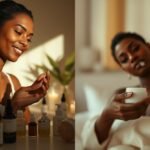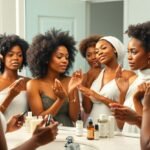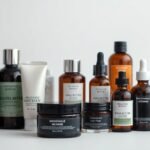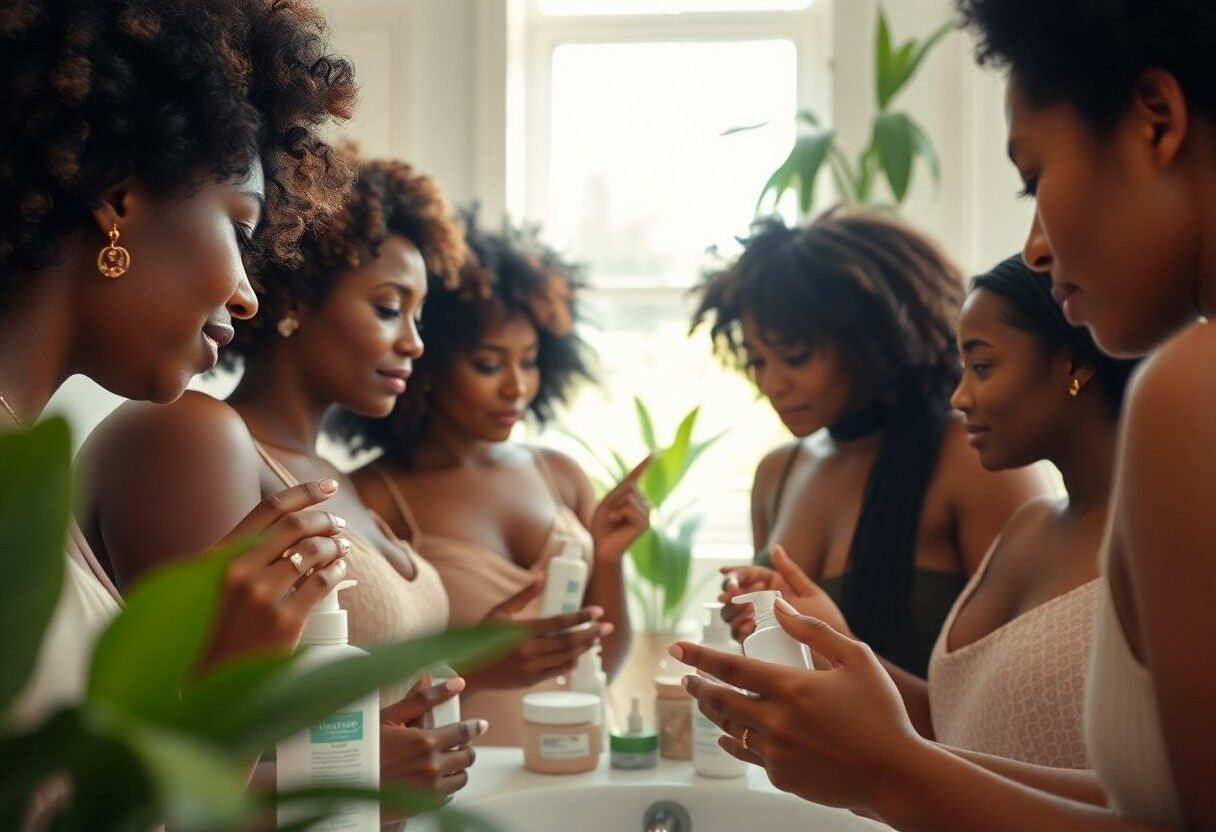
Black women face unique skincare challenges, and it’s important to tailor your routine to address these specific needs. I believe that understanding skin type, concerns, and the effects of different products is vital for achieving healthy skin. You will learn to identify the right ingredients and steps to create an effective routine that enhances your natural beauty while protecting against issues like hyperpigmentation and dryness. Let’s look into building a personalized skincare regimen that empowers you and keeps your skin glowing.
Key Takeaways:
- Identify your skin type (oily, dry, combination, or sensitive) to select products that cater specifically to your needs.
- Incorporate a gentle cleanser to remove impurities without stripping natural oils from the skin.
- Use a moisturizer that targets hydration and includes ingredients like shea butter or hyaluronic acid for better moisture retention.
- Apply sunscreen daily, even on cloudy days, to protect against UV damage; opt for broad-spectrum SPF 30 or higher.
- Consider using serums with ingredients like vitamin C or niacinamide to brighten skin tone and even out hyperpigmentation.
- Exfoliate regularly with products suitable for your skin type to promote cell turnover and remove dead skin, enhancing skin clarity.
- Be consistent with your routine, allowing time for products to work, and adjust as needed based on seasonal changes or skin reactions.
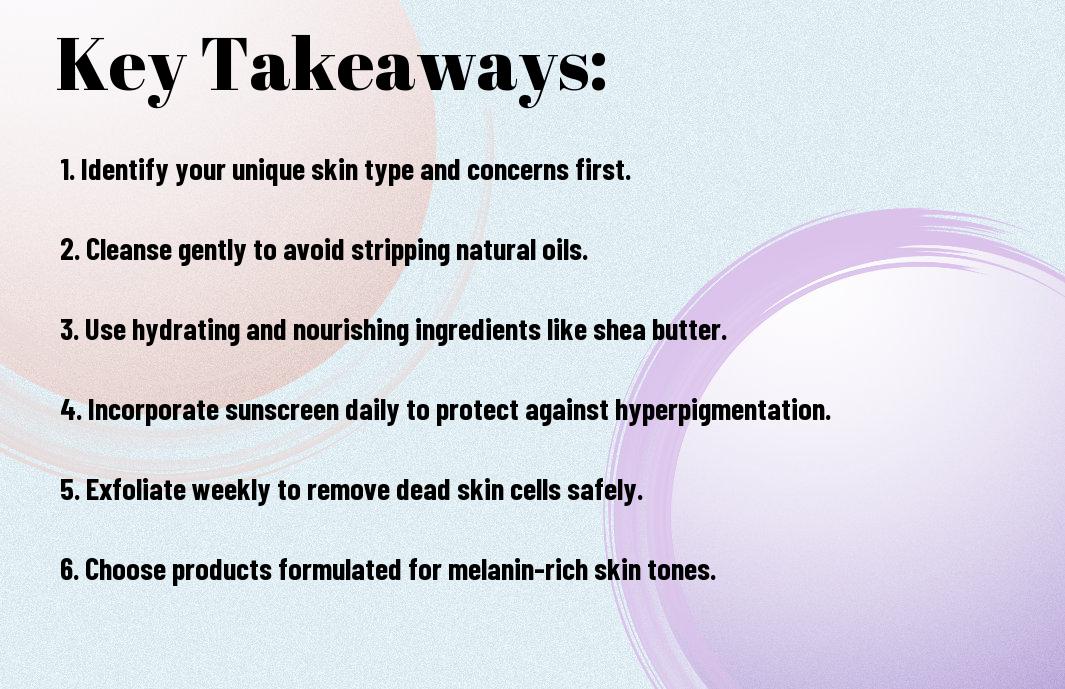
Decoding Skin Characteristics: The Science Behind Black Skin
Unique Melanin Levels and Implications for Care
Black skin contains higher levels of melanin compared to other skin types, which offers some natural protection against UV radiation and skin damage. This increased melanin can lead to a more even skin tone but also makes it important to note that hyperpigmentation may be more pronounced with any inflammation or injury. Tailoring your skincare routine to accommodate this characteristic is vital for maintaining an even complexion and preventing dark spots from forming.
Common Skin Concerns Among Black Women
Hyperpigmentation, acne scarring, and dryness are significant concerns frequently experienced by Black women. These skin issues often arise from unique physiological responses to environmental irritants and hormonal fluctuations. As you build your skincare routine, addressing these specific conditions will help enhance your skin’s overall health and appearance.
Hyperpigmentation is particularly prevalent due to increased melanin production triggered by inflammation, irritation, or acne. I’ve seen that many Black women also struggle with dark marks and uneven skin tone, a common aftermath of breakouts. Additionally, some may experience >dry, ashy skin in areas, which can be exacerbated by environmental factors or lifestyle habits. Understanding these concerns enables me to recommend targeted solutions, such as using products with gentle exfoliants or hydrating ingredients to achieve a radiant and balanced complexion.
The Foundation of Skincare: Key Ingredients and Their Importance
Essential Active Ingredients: What to Look For
When formulating your skincare routine, prioritize active ingredients that cater specifically to the needs of Black skin. Look for niacinamide to help with hyperpigmentation and even skin tone, hyaluronic acid for intense hydration, and vitamin C for its brightening properties. Additionally, retinoids can promote cell turnover and help address signs of aging. Each of these ingredients plays a role in enhancing the vibrancy and health of your skin, ensuring that it remains beautiful and balanced.
Ingredients to Avoid: Red Flags in Formulations
Steer clear of products containing alcohols, fragrance, and sulfates, which can strip moisture and exacerbate dryness or irritation in Black skin. Parabens and phthalates are also best avoided due to their potential endocrine-disrupting effects. Instead, seek out gentle, hydrating alternatives that maintain your skin’s healthy barrier.
Formulations containing harsh irritants, such as high concentrations of alcohol, can lead to increased dryness and exacerbate conditions like eczema or acne, which are more prevalent in Black individuals. Products with synthetic fragrances may trigger allergic reactions, while sulfates can strip your skin of its natural oils, causing further irritation. Always check the ingredient list for these red flags and opt for products labeled as fragrance-free or hypoallergenic to keep your skin thriving.
Crafting Your Daily Ritual: The Essential Steps
Cleansing: Choosing the Right Cleanser for Your Skin Type
Finding a cleanser tailored to your skin type is foundational for effective skincare. For oily skin, I often gravitate towards gel-based cleansers that help control sebum without stripping moisture. If your skin leans dry or sensitive, cream or lotion cleansers will provide the hydration you need while gently removing impurities. For combination skin, a balanced, pH-friendly cleanser can be the perfect solution, addressing the varying needs of your T-zone and dry areas.
Toning: The Value of Balancing Post-Cleansing
Incorporating a toner into your routine can significantly enhance your skin’s health. After cleansing, I use toner to restore my skin’s natural pH balance, which may be disrupted during the cleansing process. This step helps tighten pores and prepares the skin to absorb subsequent products more effectively.
Opting for a toner with hydrating elements like rosewater or hyaluronic acid can add an extra dose of moisture, important for maintaining skin elasticity, especially important for Black skin. Some toners also target specific issues such as enlarged pores or dullness, making this step a multi-functional powerhouse in my routine.
Treatment: Targeting Specific Concerns with Serums and Treatments
Focusing on targeted treatments allows me to address my skin’s unique concerns. Serums enriched with active ingredients like vitamin C for brightening, hyaluronic acid for hydration, or salicylic acid for acne can make a notable difference. Layering these products helps to treat conditions without overwhelming the skin.
For example, I often reach for serums containing niacinamide, which helps with hyperpigmentation—a common issue among women of color. Choosing treatments that align with your specific challenges can lead to dramatic improvements in your complexion, so it’s worth investing time in finding the right options.
Moisturizing: Optimal Hydration for Dewy Skin
Moisturizing is not just about hydration; it creates a barrier to lock in moisture and keep your skin plump. For those of us with darker skin tones, I prefer rich creams that provide long-lasting hydration without feeling heavy. Look for ingredients like shea butter and ceramides to give your skin that radiant, dewy finish.
Incorporating a lightweight, hydrating gel moisturizer during the day and a richer cream at night can balance my skin’s moisture levels effectively. Not only does this routine promote elasticity, but it also reduces the appearance of fine lines, allowing my complexion to glow.
Sun Protection: The Overlooked Essential in Skincare Routines
Applying sunscreen is a non-negotiable step that I prioritize every day. Many underestimate the importance of sun protection, thinking their melanin provides a natural shield. However, UV rays can still lead to skin damage, premature aging, and uneven skin tone.
Choosing a broad-spectrum SPF 30 or higher is key, even on cloudy days. I make it a habit to reapply every two hours while outdoors. Integrating sunscreen into my daily routine not only safeguards my skin but also enhances its overall clarity and health.
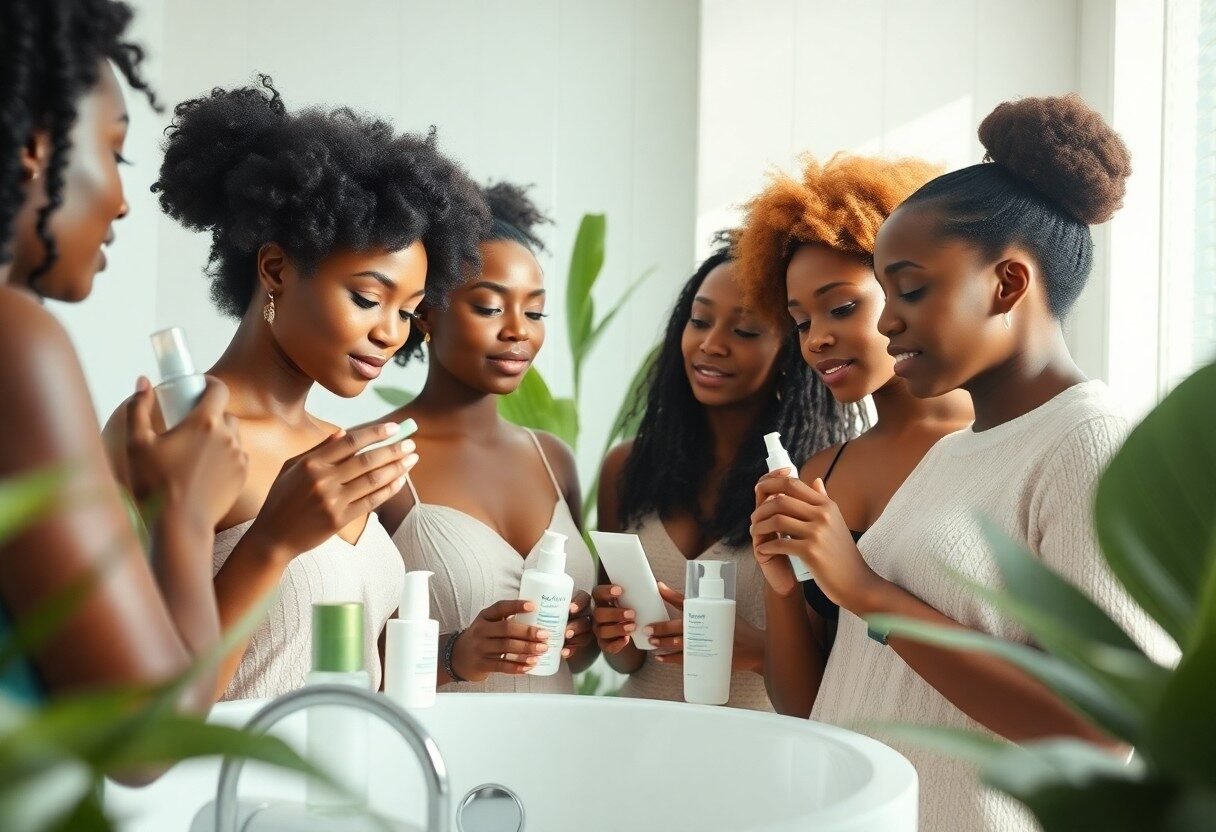
Nighttime Nourishment: The Benefits of Evening Care
The Role of Overnight Treatments
Overnight treatments serve as a *powerful addition* to your skincare routine, allowing your skin to rejuvenate while you sleep. As you rest, your body naturally goes into repair mode, and utilizing targeted products during this time can enhance skin healing, hydration, and regeneration. Ingredients such as retinol, peptides, and hyaluronic acid work deeply within the skin, helping you wake up with a more radiant and youthful complexion.
Importance of Restorative Ingredients in Night Products
Choosing night products rich in *restorative ingredients* makes a significant impact on how well your skin recovers overnight. These ingredients not only help with moisture retention but also boost collagen production and repair skin barriers. For instance, ingredients like niacinamide improve skin tone and texture, while ceramides strengthen the skin’s protective layer, making them excellent choices for evening skincare to cater specifically to the needs of Black skin.
Restorative ingredients found in nighttime products tackle various common skin concerns faced by Black women, such as hyperpigmentation and dryness. For example, incorporating *botanicals like calendula* and *chamomile* can calm skin, while *exfoliants like alpha hydroxy acids* promote cell turnover, resulting in a brighter overall appearance. Additionally, a *night cream infused with antioxidants* can combat oxidative stress, ensuring that your skin looks vibrant and healthy every morning. By focusing on these ingredients, I’m giving my skin the best opportunity to restore and renew while I sleep.
Seasonal Adjustments: Tailoring Your Routine Throughout the Year
Adapting to Seasonal Changes: Hydration vs. Oil Control
As the seasons shift, so do your skin’s needs. In the winter months, I find that my skin craves maximum hydration due to the drop in humidity. This often means switching to heavier moisturizers infused with emollients like shea butter or jojoba oil. Conversely, during the summer heat, I focus on lightweight formulas that prevent shine while providing adequate moisture. Using products with oil-controlling properties, such as gel-based moisturizers, can help maintain balance without stripping your skin.
Understanding the Climate’s Effect on Your Skin
The climate plays a significant role in how your skin behaves. Hot and humid environments can lead to increased oil production, while dry or cold conditions often leave skin feeling tight and flaky. For that reason, I adjust my products based on where I live or where I’m visiting. For instance, humid climates necessitate lighter formulations to avoid clogged pores, whereas cold, dry weather encourages thicker creams to combat moisture loss.
In the summer, UV exposure can increase the risk of hyperpigmentation in Black skin, necessitating stronger sun protection and possibly products with antioxidants to protect against free radical damage. Conversely, the winter months require a focus on repairing the skin barrier, which may involve incorporating serums rich in hydration-boosting ingredients like hyaluronic acid. Understanding how shifts in temperature and humidity directly impact my skin not only better informs my product choices but also contributes to a more resilient and radiant complexion year-round.
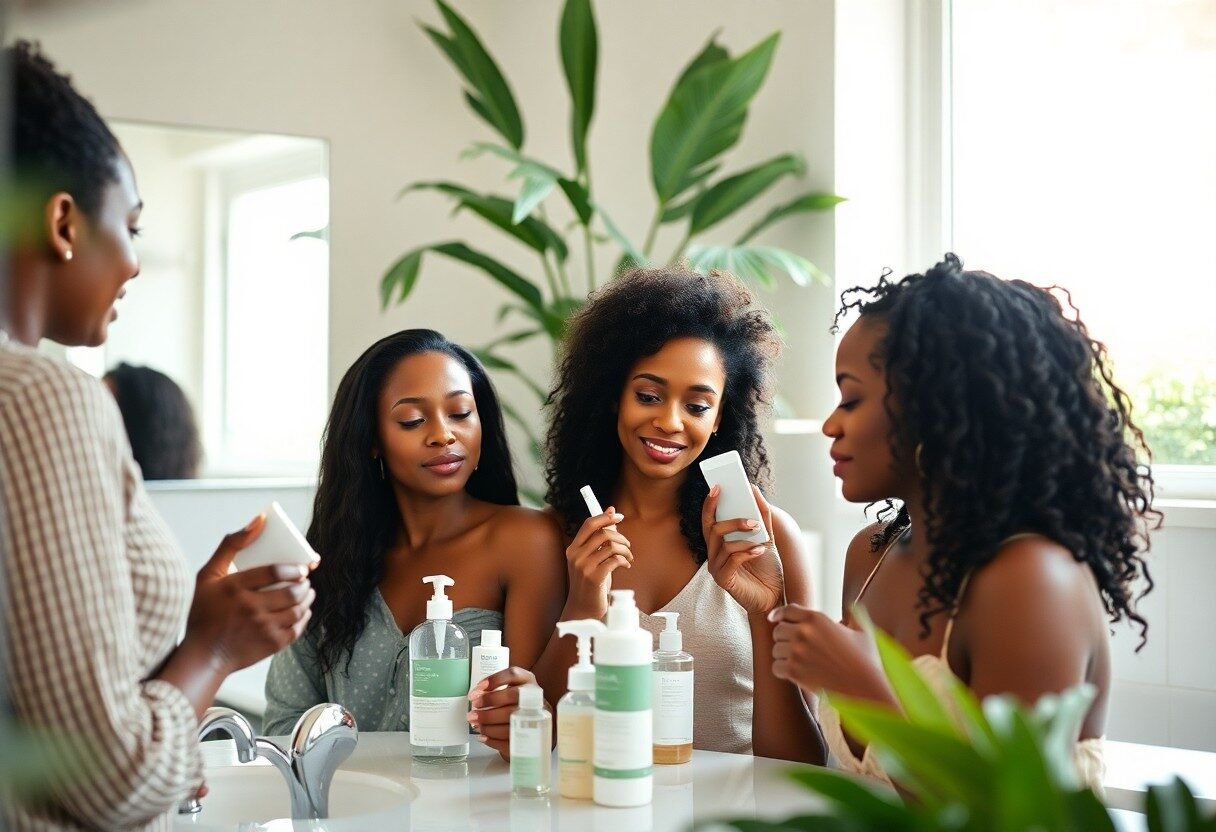
Cultural Influences: The Intersection of Tradition and Modern Skincare
Heritage Remedies and Their Evolution in Skincare
Many of us have inherited *skincare wisdom* passed down through generations, including the use of ingredients like shea butter, coconut oil, and aloe vera. These traditional remedies often focus on natural, holistic approaches that leverage indigenous plant power to nourish and heal the skin. Over time, these heritage remedies have evolved and integrated with modern formulations, resulting in products that honor our roots while offering improved efficacy.
How Community Practices Shape Individual Routines
Community practices serve as a fundamental influence on your skincare routine. Social media, local gatherings, and familial advice create a tapestry of shared knowledge and preference, allowing you to discover what truly benefits your skin type. In urban areas, for instance, *beauty pop-ups* and workshops often showcase diverse skincare brands that cater to the specific needs of Black women, incorporating cultural preferences that resonate with you and your peers.
Engaging in discussions within your community can introduce you to innovative products that align with your unique skin needs. Whether it’s an aunt swearing by her homemade sugar scrub or a friend recommending a new local beauty brand, *the collective experiences shape what you might consider for your skincare*. Moreover, by participating in community conversations, *you build a support network* that helps demystify the overwhelming choices in the skincare market, honing in on what genuinely works for your individual routine.
Common Missteps: Pitfalls to Avoid in Your Skincare Journey
Over-Exfoliation: The Dangers of Too Much Care
Exfoliating seems like a fast track to radiant skin, but too much exfoliation can lead to a stripped barrier, irritation, and increased sensitivity. I’ve learned the hard way that more is not always better. Stick to exfoliating 1-2 times a week and listen to your skin’s response. If you notice redness or dryness, cut back immediately.
Ignoring Ingredients: The Risk of Mislabeling and Misinformation
Product labels can be misleading. I’ve often found that what is marketed as ‘natural’ or ‘gentle’ can contain harsh chemicals that irritate my skin. Understanding ingredients is important for informed choices. Instead of relying solely on marketing terms, dive deep into what your skincare products are composed of, paying attention to formulations that work with your skin type.
Many products boast trendy ingredients like “rosehip oil” or “activated charcoal,” but these buzzwords don’t always translate to effectiveness for every skin type, particularly for darker skin. For example, certain acids can cause hyperpigmentation if used improperly. Researching and understanding ingredients like glycolic acid, salicylic acid, or even natural oils can be the difference between finding your holy grail product and suffering from unexpected breakouts or irritation. Always check the full ingredient list, and consider consulting with a dermatologist if you are unsure about what is best for your skin health.
Empowering Yourself: The Role of Education and Advocacy in Skincare
Understanding Your Skin Needs: Research and Resources
Knowledge is power, especially in skincare. Exploring scientific articles, attending virtual workshops, and consulting reliable sources can help you understand the unique characteristics of your skin. The skin of Black women, often richer in melanin, may experience specific concerns like hyperpigmentation and dryness. Resources like dermatology websites or books focused on melanin-rich skin types can provide valuable insights into tailored solutions for your complexion.
Building a Support Network: The Importance of Community Knowledge Sharing
Cultivating a robust community around skincare can significantly enhance your journey. Engaging with online forums, social media groups, or local meetups enables you to share experiences, learn from others’ successes, and support each other through challenges. This communal wisdom often reveals tips and products that may not have widespread recognition yet.
Building a support network doesn’t just mean joining discussions; it’s about creating a space where shared experiences form a foundation of trust and understanding. By leveraging platforms like Instagram or dedicated Facebook groups, I’ve found fellow skincare enthusiasts who can offer product recommendations based on similar skin types and issues. Sometimes, a friend’s testimonial about a product can be more convincing than any advertisement. Plus, these interactions foster a sense of empowerment. Not only do we learn from each other, but we also become advocates for brands and practices that prioritize the specific needs of Black skin, challenging the mainstream narrative around skincare.
Summing up
Presently, building a skincare routine tailored for Black women involves understanding your unique skin type and needs. I suggest beginning with a gentle cleanser, followed by a hydrating toner, effective serums, and a moisturizer that targets your concerns. Don’t forget to include sunscreen in your daily regimen, as it protects against hyperpigmentation. I encourage you to listen to your skin, adjust your routine as necessary, and consult with a dermatologist if needed. This approach will help you achieve healthy, radiant skin that reflects your beauty.
FAQ
Q: What are the vital steps in a skincare routine for Black women?
A: The vital steps in a skincare routine for Black women typically include: cleansing, toning, moisturizing, and applying sunscreen. Cleansing removes dirt and makeup, toning helps to balance the skin’s pH, moisturizing hydrates and nourishes the skin, and sunscreen protects against harmful UV rays. It’s important to tailor each step to your specific skin type, whether it’s oily, dry, or combination.
Q: How can I determine my skin type?
A: To determine your skin type, start by washing your face with a gentle cleanser and patting it dry. Wait for an hour without applying any products, then observe how your skin feels. If it feels tight or flaky, you may have dry skin. If it appears shiny, particularly in the T-zone (forehead, nose, chin), you likely have oily skin. If some areas are oily and others are dry, you may have combination skin. If your skin feels comfortable without dryness or oiliness, you might have normal skin.
Q: What ingredients should I look for in products for hyperpigmentation?
A: For hyperpigmentation, look for ingredients such as vitamin C, niacinamide, kojic acid, salicylic acid, and licorice root extract. These ingredients can help brighten the skin and fade dark spots. Additionally, incorporating exfoliants like alpha hydroxy acids (AHAs) or beta hydroxy acids (BHAs) can further assist in improving skin tone.
Q: How often should I exfoliate my skin?
A: It is generally recommended to exfoliate 1-3 times per week, depending on your skin’s sensitivity and the type of exfoliant you are using. Gentle physical scrubs can be used less frequently, while chemical exfoliants like AHAs or BHAs can be used more often but should be introduced gradually. Always listen to your skin and adjust frequency based on how your skin reacts.
Q: Is it necessary to use sunscreen every day?
A: Yes, using sunscreen daily is vital, even on cloudy days or if you are indoors, as UV rays can penetrate windows. Choose a broad-spectrum sunscreen with at least SPF 30. For Black women, it is important to find a sunscreen that doesn’t leave a white cast, which can be particularly problematic for deeper skin tones. Look for tinted sunscreens or those specifically formulated for darker skin tones.
Q: How can I address issues with acne as a Black woman?
A: Addressing acne requires a tailored approach. It’s important to use non-comedogenic products that won’t clog your pores. Ingredients such as salicylic acid, benzoyl peroxide, and tea tree oil can be effective. Consistency in your skincare routine and avoiding harsh scrubs can help. If acne persists, consulting a dermatologist for personalized treatments may also be beneficial.
Q: Can I mix products from different brands in my skincare routine?
A: Yes, it’s often acceptable to mix products from different brands, however, make sure to keep the key ingredients in mind. Avoid combining too many active ingredients in one routine (like mixing multiple exfoliants), as this can irritate your skin. It’s a good strategy to introduce new products one at a time to monitor how your skin responds. Patch testing new products can also prevent adverse reactions.

